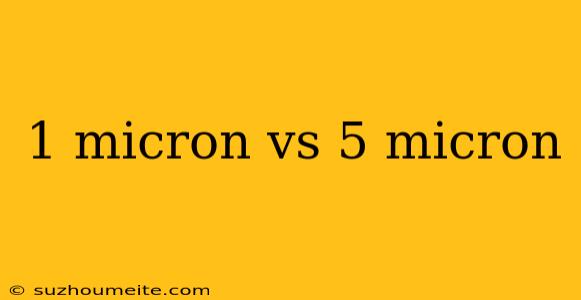1 Micron vs 5 Micron: Understanding the Difference
When it comes to water filtration, one of the most crucial factors to consider is the micron rating of the filter. The micron rating refers to the size of the pores in the filter, which determines the size of the particles that can pass through. In this article, we will explore the difference between 1 micron and 5 micron filters, and help you decide which one is best for your needs.
What is a Micron?
A micron is a unit of measurement that is equal to one millionth of a meter. In the context of water filtration, micron ratings refer to the size of the pores in the filter. The smaller the micron rating, the smaller the pores, and the more effective the filter is at removing impurities from the water.
1 Micron Filter
A 1 micron filter has pores that are 1 micron in size. This means that the filter can remove particles as small as 1 micron from the water. This includes:
- Bacteria: Most bacteria are between 0.5-5 microns in size, making a 1 micron filter effective against many types of bacteria.
- Viruses: Some viruses can be as small as 0.1 microns, but a 1 micron filter can still remove many types of viruses.
- Particulates: A 1 micron filter can remove particulates such as dirt, rust, and sediment from the water.
5 Micron Filter
A 5 micron filter has pores that are 5 microns in size. This means that the filter can remove particles as small as 5 microns from the water. This includes:
- Larger particulates: A 5 micron filter can remove larger particulates such as dirt, sand, and sediment from the water.
- Some bacteria: A 5 micron filter can remove some types of bacteria, but may not be effective against smaller bacteria.
Key Differences
The key differences between a 1 micron and 5 micron filter are:
- Particle removal: A 1 micron filter can remove smaller particles than a 5 micron filter.
- Effectiveness against bacteria and viruses: A 1 micron filter is more effective against bacteria and viruses than a 5 micron filter.
- Flow rate: A 5 micron filter typically has a faster flow rate than a 1 micron filter, as it has larger pores.
Choosing the Right Filter
When choosing a filter, consider the following factors:
- Water quality: If your water supply is heavily contaminated, a 1 micron filter may be necessary to remove smaller particles.
- Flow rate: If you need a high flow rate, a 5 micron filter may be a better choice.
- Cost: 1 micron filters are typically more expensive than 5 micron filters.
In conclusion, a 1 micron filter is a more effective filter than a 5 micron filter, but it may also be more expensive and have a slower flow rate. Ultimately, the choice between a 1 micron and 5 micron filter depends on your specific needs and requirements.
